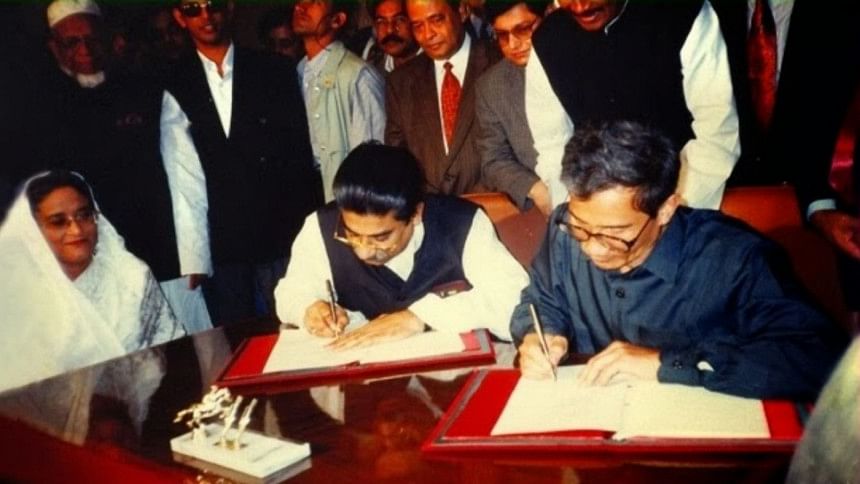A saga of un-kept promises

Come 2017, it would be two decades of the signing of the CHT Accord, and today is the 19thanniversary. On December 2, 1997, the Government of Bangladesh (GoB) signed a historic Accord with the ethnic communities of the Chittagong Hill Tracts. Sheikh Hasina and the AL can justifiably take credit for inking the deal that saw the end of two decades of conflict in the hills. However, just to put the matter in the correct perspective, it must be said that the urge to find a peaceful political denouement to the unrest in CHT had stimulated actions in the mid-80s and the early-90s, when several rounds of talks were initiated between the Shanti Bahini / PCJSS led by Shantu Larma, and the GoB.
Nothing positive came about then mainly because the texts, and the sub texts that were not written but implied in the demands, were beyond the writ of any government, let alone a military government, to consider. Even the elected government of Khaleda Zia had involved the PCJSS in talks but nothing positive eventuated. Every government had sought a solution but the AL was successful in brokering a deal. The purpose of recounting the past is to highlight the fact that every major political party has a stake in the matter and must pursue the fulfilment of all the provisos of the Accord in full.
Regrettably, even after 19 years, the hill people remain dissatisfied with the pace of the implementation of the Accord. Every year on the anniversary of the Accord Shantu Larma vents his spleen at the way the Accord has been implemented. In 2004 Larma had laid a six-point demand on the government's table related to the fulfillment of the Accord. The ante was graduated further up the next year when he talked about reverting to guerilla war if the CHT Accord remained unfulfilled any longer. He has repeated the disappointment this year too, although not in as many words.
One cannot blame him for being so blunt about his disappointment. He had put his credentials as a leader of the all the tribal communities in the CHT on the line when he entered into an agreement with the GoB in 1997. There was a segment among his followers which was opposed to any sort of understanding that would dilute their initial demand for autonomy for the CHT. And there is still a group that is opposed to the current Accord in its entirety. Admittedly, Shantu Larma had the farsightedness to understand that armed struggle was no longer the answer, and that his struggle would soon run out of steam because there was strong international opinion against sub-national movements that sought to undermine the essence of nation state through violence. Also, with a change of regime in Bangladesh in 1996, the external support which had propped up the Shanti Bahini, and sustained its insurgency for nearly two decades, was likely to end. It was therefore as much for the sake of peace as for the strategic reality that motivated Shantu Larma to sue for a peaceful resolution of the CHT conflict.
Although a good number of the provisos have been implemented, the sticking ones like functioning of the HDCs and devolution of power to them as well as the land issue remain the biggest hurdles. Although the CHT Land Commission Act has been amended, land issue remains the nub of the problem that must be addressed with honesty and transparency.
The Accord is also encumbered in a legal process. The High Court had on 12-13 April 2010 observed that the CHTRC Act 1998 was unconstitutional for it violated the 'characteristic of the unitary structure of the state.' The HC also declared unconstitutional Section 4(6), 17, 32(2), and 62(1) of the Rangamati Hill District Council (HDC) Act 1989, Khagrachari HDC Act 1989 and Bandarban HDC Act 1989, as amended in 1998 in accordance with CHT Accord, saying that the amended provisions violated the 'characteristic of a unitary state.' However, the Appellate Division of the Supreme Court stayed the HC verdict on 15 April 2010 for six weeks. The stay order was extended till regular appeal but we are not aware of a regular appeal having been submitted in the last six years.
While it would have been well for the AL government to take all the major political parties on board before the Accord was signed in 1997, that would have made all parties own the deal, none can soft pedal on the matter since, as we have recounted in the foregoing paragraphs, every party had wanted to see permanent peace prevail in the hills.
Encumbrances there may be, but those must be addressed by involving all stake holders. The state has made a commitment to a section of its people. It cannot not fulfill it.
The writer is Associate Editor, The Daily Star.

 For all latest news, follow The Daily Star's Google News channel.
For all latest news, follow The Daily Star's Google News channel. 



Comments